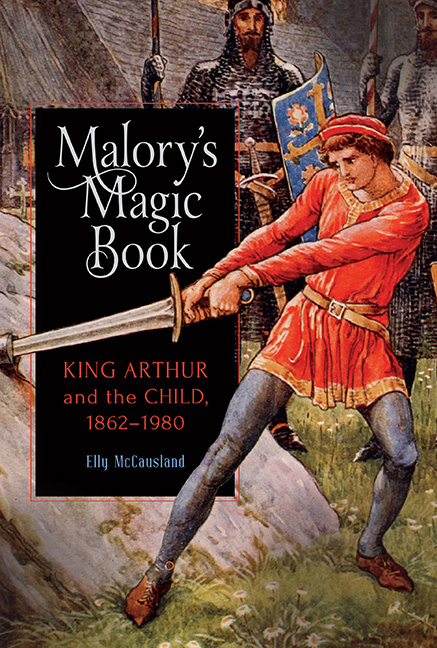Book contents
- Frontmatter
- Dedication
- Contents
- List of illustrations
- Acknowledgements
- A note on names
- Introduction
- 1 ‘Ever fresh and fascinating to the boy and girl of today’: the timeless child and the childish medieval in nineteenth-century Arthuriana
- 2 Risk and revenue: adventurous Arthurian masculinities in the work of Howard Pyle and Henry Gilbert
- 3 The ill-made adult and the mother's curse: psychoanalysing the Arthurian child in T. H. White's The Once and Future King
- 4 ‘Monty Python was not that far away’: the instability of 1950s Arthuriana for children
- 5 ‘For a little while a magician’: potent childish fantasies in John Steinbeck's Acts of King Arthur and his Noble Knights
- Conclusion: At the crossing-places
- Bibliography
- Index
- Arthurian Studies
2 - Risk and revenue: adventurous Arthurian masculinities in the work of Howard Pyle and Henry Gilbert
Published online by Cambridge University Press: 04 April 2019
- Frontmatter
- Dedication
- Contents
- List of illustrations
- Acknowledgements
- A note on names
- Introduction
- 1 ‘Ever fresh and fascinating to the boy and girl of today’: the timeless child and the childish medieval in nineteenth-century Arthuriana
- 2 Risk and revenue: adventurous Arthurian masculinities in the work of Howard Pyle and Henry Gilbert
- 3 The ill-made adult and the mother's curse: psychoanalysing the Arthurian child in T. H. White's The Once and Future King
- 4 ‘Monty Python was not that far away’: the instability of 1950s Arthuriana for children
- 5 ‘For a little while a magician’: potent childish fantasies in John Steinbeck's Acts of King Arthur and his Noble Knights
- Conclusion: At the crossing-places
- Bibliography
- Index
- Arthurian Studies
Summary
In 1917, four years before he produced the eponymous Newbolt Report investigating the state of English Studies in England, which would identify the Arthurian legend as the third most popular book within London elementary schools, the writer and journalist Henry Newbolt published The Book of the Happy Warrior. A collection of inspirational militaristic hero stories for young boys, the book reflected Newbolt's persistent interest in the educational value of chivalric narratives. It included the tales of Richard the Lionheart and Robin Hood, and was accompanied by the author's musings upon boyhood, chivalry and education. The book concluded with a (lengthy) injunction to its boy reader:
Take the full happiness of life, the happiness of serving, loving, befriending, and defending – the happiness of fighting and conquering all that is difficult or dangerous or devilish, whether in men or circumstances. Play games, for recreation, but not too seriously, because when they are serious they are neither quite games nor quite the real thing. The real thing is mastery, the power to use the world and all its resources, and hand it on improved to those who come after you. One joy of this mastery is what is called sport – the joy of pitting your courage, your endurance, or your skill against others, men, animals, or mechanisms; better still if it is team work, and best of all if it is the great hazard of life and death, in the service of a cause that is worth a man's life. To gain this mastery, to fit yourself for such a service, you must accept the training offered you, and you must help to train yourself; learn to do everything that man can do […] learn the lives and the adventures of great men, and the thoughts and feelings they have recorded in their books; learn to be a man yourself, not a half-developed or lop-sided creature, but a man full grown, full of all life that can be got from men and spent for men again.
Newbolt couches the ‘happiness of life’ in specifically militaristic terms: serving, defending and conquering. The related notion of achieving mastery over the world and its resources combines a chivalric and a colonialist ethic through an emphasis on human control, identifying success in the ability to manage and manipulate danger.
- Type
- Chapter
- Information
- Malory's Magic BookKing Arthur and the Child, 1862–1980, pp. 53 - 82Publisher: Boydell & BrewerPrint publication year: 2019



